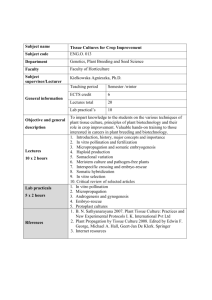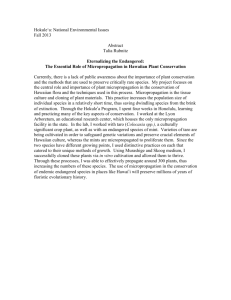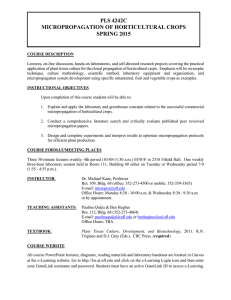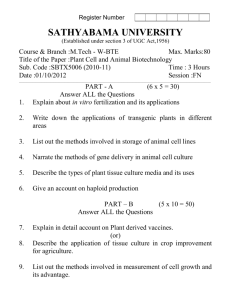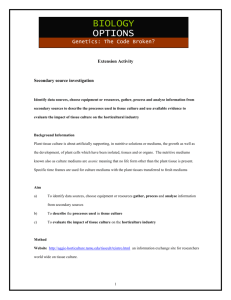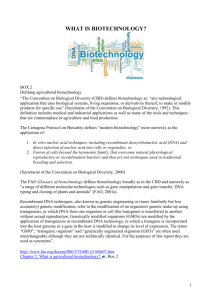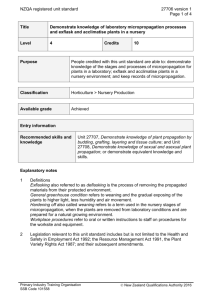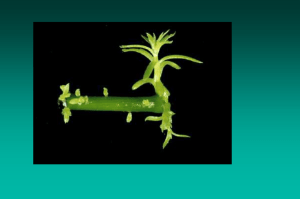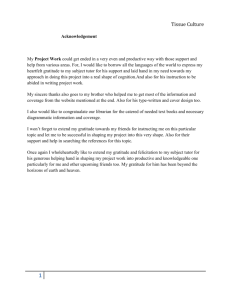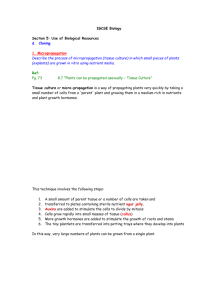PLS 4242C/5241C MICROPROPAGATION OF HORTICULTURAL CROPS SPRING 2016
advertisement
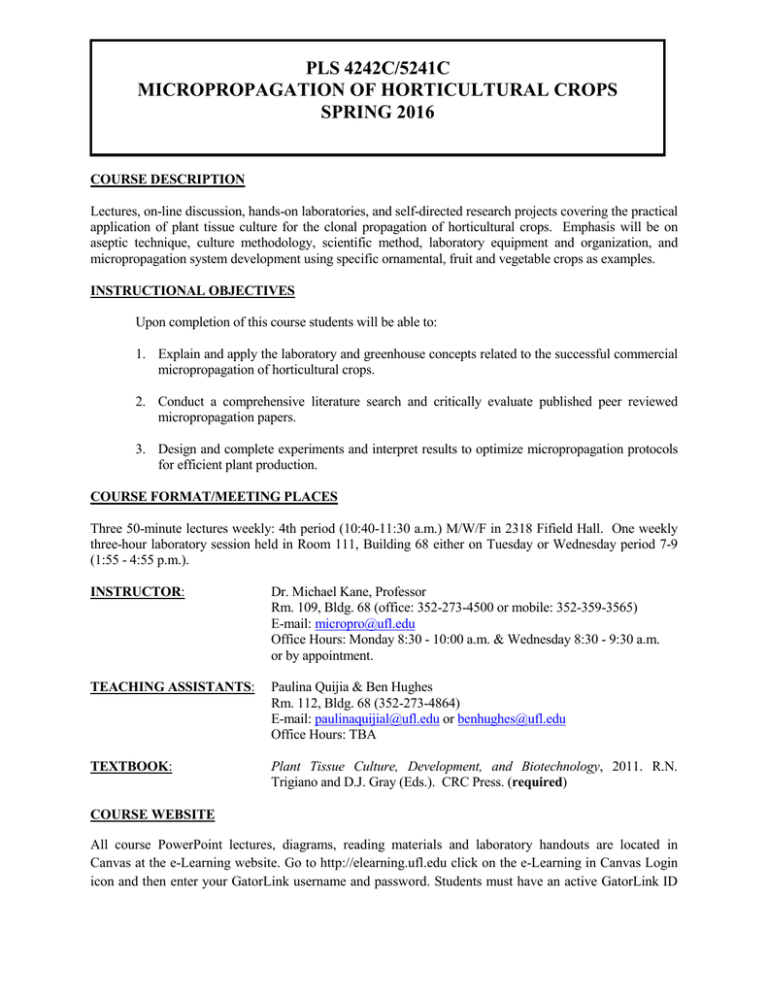
PLS 4242C/5241C MICROPROPAGATION OF HORTICULTURAL CROPS SPRING 2016 COURSE DESCRIPTION Lectures, on-line discussion, hands-on laboratories, and self-directed research projects covering the practical application of plant tissue culture for the clonal propagation of horticultural crops. Emphasis will be on aseptic technique, culture methodology, scientific method, laboratory equipment and organization, and micropropagation system development using specific ornamental, fruit and vegetable crops as examples. INSTRUCTIONAL OBJECTIVES Upon completion of this course students will be able to: 1. Explain and apply the laboratory and greenhouse concepts related to the successful commercial micropropagation of horticultural crops. 2. Conduct a comprehensive literature search and critically evaluate published peer reviewed micropropagation papers. 3. Design and complete experiments and interpret results to optimize micropropagation protocols for efficient plant production. COURSE FORMAT/MEETING PLACES Three 50-minute lectures weekly: 4th period (10:40-11:30 a.m.) M/W/F in 2318 Fifield Hall. One weekly three-hour laboratory session held in Room 111, Building 68 either on Tuesday or Wednesday period 7-9 (1:55 - 4:55 p.m.). INSTRUCTOR: Dr. Michael Kane, Professor Rm. 109, Bldg. 68 (office: 352-273-4500 or mobile: 352-359-3565) E-mail: micropro@ufl.edu Office Hours: Monday 8:30 - 10:00 a.m. & Wednesday 8:30 - 9:30 a.m. or by appointment. TEACHING ASSISTANTS: Paulina Quijia & Ben Hughes Rm. 112, Bldg. 68 (352-273-4864) E-mail: paulinaquijial@ufl.edu or benhughes@ufl.edu Office Hours: TBA TEXTBOOK: Plant Tissue Culture, Development, and Biotechnology, 2011. R.N. Trigiano and D.J. Gray (Eds.). CRC Press. (required) COURSE WEBSITE All course PowerPoint lectures, diagrams, reading materials and laboratory handouts are located in Canvas at the e-Learning website. Go to http://elearning.ufl.edu click on the e-Learning in Canvas Login icon and then enter your GatorLink username and password. Students must have an active GatorLink ID to access e‐Learning. Students who do not have GatorLink IDs, who cannot remember their GatorLink login information, who experience difficulties with Canvas, or whose IDs do not work, should contact the GatorLink website http://gatorlink.ufl.edu or to the UF Computing Help Desk for assistance: Hub 132 or 392‐HELP. GRADING DISTRIBUTION First Exam Second Exam Final Exam Quizzes (5) Participation Review Paper Readings Lab Practicum (2) Lab Reports (3) Project Report & Presentation 15% 15% 15% 10% 5% 10% 5% 5% 10% 10% (February 26th) (April 8th) (April 28th, 12:30 – 3:30 p.m., 2318 Fifield Hall) (Unannounced) (classroom discussions) (Due March 4th) Reading question responses (February 23rd/24th and April 13th) (Due dates TBA) (April 19th or 20th in lab) GRADING SCALE Course Average Grade 90-100.................. A 86-89 ................... B+ 80-85 ................... B 76-79 ................... C+ 70-75 ................... C 66-69 ................... D+ 60-65 ................... D 0-59 ..................... E ATTENDANCE AND MAKEUP WORK I am very committed to the objective that all students will learn the conceptual information in the lecture period and the micropropagation procedures during each laboratory session. Therefore, I expect that students will attend all lectures and laboratory sessions and arrive on time. Missed exams or laboratories cannot be made up unless a valid reason and documentation is provided. Requirements for class attendance and make-up exams, assignments and other work are consistent with university policies which can be reviewed at: UF Student Attendance Policies. Please note that any special instructional handouts will only be available from Dr. Kane on the day that they are distributed in class or laboratory. 2 Learning Module Topic 1 Plant Tissue Culture Applications for Clonal Propagation & Historical Perspective 2 3 4 5 6 7 8 9 10 11 12 13 14 15 Micropropagation Informational Resources Developmental Pathways for Plant Regeneration: Overview & Node Culture Developmental Pathways for Plant Regeneration: Shoot Culture Micropropagation By Shoot Culture: Woody Plants Micropropagation By Shoot Culture: Native Wetland Plants Developmental Pathways for Plant Regeneration: Direct Shoot Organogenesis Developmental Pathways for Plant Regeneration: Indirect Shoot Organogenesis Developmental Pathways for Plant Regeneration: Non-zygotic Embryogenesis Establishment of Sterile Cultures: Technique & Equipment Culture Indexing Procedures & Antibiotic Use and Misuse Culture Media: Selection & Preparation Factors Affecting Explant Response In Vitro Developmental and Physiological Problems in Micropropagated Plants Automated Micropropagation Textbook Chapters1 8, 16, 31, 33, 38, 39 40, 41, 45 Handout 8, 17, 43 12 Papers Papers 19,20 19,20 22,23 2,3 17,18 2,3,4 4 4 Papers 1 Completion of the textbook chapter and scientific paper reading assignments are critical to mastering both the concepts and practical procedures. Students will be required to submit written responses to periodic questions based on the assigned readings. These readings will be frequently discussed in class and online. Please be prepared to discuss these readings. MICROPROPAGATION PROTOCOL REVIEW PAPER A ten (10) page double-spaced typed review paper (not including references) will be due on Friday, March 4, 2016. Please note that no time extensions will be allowed. This paper will represent 10% of your final grade. You will select a specific plant species and then research the available peer reviewed published literature to review the micropropagation protocols developed for the particular plant or crop selected. Please submit your species/crop selection in Canvas to me by Friday, January 20, 2016 no later than 5:00 pm. The plant species/crop selected for your paper must be approved by Dr. Kane before proceeding. The instructional objectives of this exercise are for each student to: 1) become familiar with the procedures required to obtain information on specific micropropagation protocols; 2) be able to critically analyze the published information and communicate the result of these analyses in written form and; 3) design a micropropagation protocol following critical analysis of the information collected. Note that the plant species selected cannot be one used in any of the laboratory exercises. Students will then choose the same plant species that is used for the self-directed laboratory experience (see below). To find your papers, you should begin by choosing appropriate key words and searching the electronic online journals listed at the UF George A. Smathers Libraries website for published research on your chosen plant. I will further discuss informational resources in lecture and provide you with additional useful information. For your review, select at least ten (10) original and relevant peer reviewed (refereed) research papers. It is very important that you obtain complete copies of each original journal article. Do not rely on indirect sources such as abstracts, research summaries, book chapters or review articles to evaluate the 3 quality and importance of the information presented in the original paper. Inclusion of review articles will not count toward the required 10 references. In class on Monday, February 3, 2016 please submit a printed list of the full citations of the 10 refereed papers that you have chosen for your review. The University of Florida maintains digital subscriptions to many journals. As UF students, you can often directly print off PDF versions of more recent publications by visiting the specific journal websites. Older journal volumes can be located by consulting the UF Libraries' Catalog online. These articles will probably have to be photocopied in the library. In your paper, be sure to discuss, compare and contrast any donor plant pretreatments [Stage 0], indicate the explants used, optimal surface sterilization procedures, optimal media for Stage I [culture initiation], Stage II [propagule multiplication], and Stage III [pretransplant/rooting] and Stage VI [transplant procedures]. Discuss any conflicting differences in results reported in the papers that you have read. Please be sure to correctly cite each paper by authors and date in the text. Based upon your analytical review, in a final section, describe, in 1 page, a complete micropropagation protocol that you would attempt to use. At the end of your paper also be sure to completely list and correctly cite the references used. Note: papers not following this format will be returned without a grade. Please be sure to attach printed copies of the ten research papers you used to write your review paper. A detailed grading rubric for this assignment will be provided. Your grade will depend on organization, integration, critical analysis and clarity. Graduate student papers will be more critically reviewed. I suggest that you allow a friend (or critic) to read your paper before submission. Your paper must be free of spelling and grammatical errors. A copy of a previously submitted student review paper will be provided. LABORATORY REPORTS You will be expected to maintain a laboratory exercise research notebook in which you will record the experimental procedures used and weekly observations and/or data collected for each of the laboratory exercises. Students will periodically be asked to show their individual research notebooks for review. Three laboratory reports, based on data generated from experiments, will be submitted in the format of a scientific paper. Report writing guidelines will be provided. Submission deadlines for these reports will be dependent on plant culture responses. A detailed grading rubric for this assignment will also be provided. SELF-DIRECTED LABORATORY RESEARCH EXPERIENCE Students, outside of the regularly scheduled laboratory period, will independently attempt to successfully micropropagate a single plant species. The same species used for the micropropagation protocol review paper will also be used for this assignment. Note that the plant species selected cannot be one used in any of the laboratory exercises. Students are responsible for obtaining their own plant materials for this assignment. I will assist when possible. Students will have the option to use in vitro germinated seed as their starting material for their self-directed projects. The micropropagation teaching laboratory located in Rm. 111 at 2043 IFAS Research Drive (Bldg. 68) will be open only on Thursdays and Fridays from 8:00 a.m. - 5:00 p.m. for this purpose. There will be a sign-up sheet in Rm. 111 to allow students to reserve a transfer hood for two-hour time blocks. Three transfer hoods will be available for this exercise. Students will be expected to work independently without supervision. Several types of culture media, for each stage, will be made available for this exercise. Tubes containing these media, sterile water and glassware prepared specifically for this exercise will be available in a designated area in the teaching laboratory. IMPORTANT: All other materials (media, sterile water, or glassware) for use in teaching scheduled micropropagation laboratory exercises must not be used. 4 For the self-directed project, you will also be expected to record detailed notes and data in your research notebook. This information will the experimental procedures used, weekly observations, data collected and statistical analysis. As noted above students will periodically be asked to show their individual research notebooks for review. Students will be required to submit a laboratory project report describing the results of their self-directed project using the same format used for laboratory reports. This report will be due in your lab section on either April 19 or 20, 2016. At that time you will be required to give a brief (10minute) overview presentation of your results. The final report and presentation will account for 10% of your final grade. Depending on the success achieved in completing each of the four micropropagation stages (Stage I – IV), you will receive up to four (4) extra credit points to your final grade. Successful sequential completion of each stage (1 extra credit point each) is required (e.g., no skipping the Stage III rooting stage) to achieve points. Cultures will be continually evaluated during the semester up until the last laboratory period (April 19th or 20th). Students will be given the opportunity to successfully achieve Stage IV in the greenhouse up until the day of the final exam (April 28, 2016) when a final greenhouse evaluation will be made. 5 PLS 4242C/5241C LABORATORY SCHEDULE1 Spring 2016 DATE LABORATORY EXERCISE Jan. 12/13 1. Micropropagation Laboratory Orientation & Aseptic Technique Jan. 19/20 2. Meristem Tip Culture - Carnation Jan. 26/27 3. Miniature Rose Shoot Culture Feb 2/3 4. In Vitro Layering and Microtuberization of Potato Feb. 9/10 Feb. 16/17 5. Bacterial/Fungal/ Viral Culture Indexing 6. Micropropagation Using Floral Explants – Cauliflower Florets 7. Stage II Medium Cytokinin Optimization Laboratory Practicum #1 Feb. 23/24 8. Stage III In Vitro Rooting Procedures 9. Stage IV Acclimatization Procedures Potato In Vitro Layering Data Collection Mar. 1/2 Mar. 8/9 Mar. 16/17 Mar. 23/24 10. Orchid Seed Culture Potato Microtuberization Data Collection Spring Break – No lectures or labs held this week 11. Direct and Indirect Shoot Organogenesis – Myriophyllum aquaticum Stage II Medium Cytokinin Optimization Data Collection 12. Non-Zygotic Embryogenesis of Orchard Grass (Dactylis glomerata) Stage III In Vitro Rooting Procedures Data Collection Mar. 29/30 Apr. 5/6 Apr. 12/13 Open Stage II Medium Cytokinin Optimization Data Collection Direct and Indirect Shoot Organogenesis Data Collection Orchard Grass Non-Zygotic Embryogenesis Data Collection 13. Synthetic Seed Technology Laboratory Practicum #2 Apr. 13 Apr. 19/20 (in lecture) Self-Directed Project Report Submission, Presentations & Laboratory Clean-up 1 Lab schedule, including data collection times may be revised depending on availability of plant materials and culture responses. 6 IMPORTANT DATES TO REMEMBER PLS 4242C/5241C (Spring 2016) DATE ITEM JANUARY 6th FIRST LECTURE JANUARY 12th OR 13th FIRST LABORATORY JANUARY 18th MARTIN LUTHER KING HOLIDAY JANUARY 20th SUBMIT REVIEW PAPER PLANT SPECIES (same for self-directed project) FEBRUARY 3th LIST OF 10 REFERENCES FOR REVIEW PAPER DUE FEBRUARY 26th FIRST HOURLY EXAM LAB PRACTICUM #1 FEBRAURY 23th or 24th (IN LAB) MARCH 7th - 11th SPRING BREAK - NO CLASSES MARCH 14th REVIEW PAPER DUE APRIL 8th SECOND HOURLY EXAM APRIL 13th LAB PRACTICUM #2 (IN LECTURE) SELF-DIRECTED PROJECT CULTURE EVALUATION (IN LAB) APRIL 19th or 20th SELF-DIRECTED PROJECT REPORT & PRESENTATION (IN LAB) APRIL 20th LAST DAY OF CLASS (On-Line Evaluations to be completed) FINAL EXAM APRIL 28th 2318 Fifield (12:30 – 3:30 p.m.) 7 GRADES AND GRADE POINTS For information on current UF policies for assigning grade points, see UF Grading Policies ONLINE COURSE EVALUATION PROCESS Student assessment of instruction is an important part of efforts to improve teaching and learning. At the end of the semester, students are expected to provide feedback on the quality of instruction in this course using a standard set of university and college criteria. These evaluations are conducted online at Faculty Course Evaluations. Evaluations are typically open for students to complete during the last two or three weeks of the semester; students will be notified of the specific times when they are open. Students will be given time to complete the course evaluation during the last class period on their laptop, tablet or smartphone. Summary results of these assessments will be available to students at Online Course Evaluation Results. ATTENDANCE POLICIES Requirements for class attendance and make-up exams, assignments and other work are consistent with university policies that can be found at: UF Attendance Policies ACADEMIC HONESTY As a student at the University of Florida, you have committed yourself to uphold the Honor Code, which includes the following pledge: “We, the members of the University of Florida community, pledge to hold ourselves and our peers to the highest standards of honesty and integrity.” You are expected to exhibit behavior consistent with this commitment to the UF academic community, and on all work submitted for credit at the University of Florida, the following pledge is either required or implied: "On my honor, I have neither given nor received unauthorized aid in doing this assignment." It is assumed that you will complete all work independently in each course unless the instructor provides explicit permission for you to collaborate on course tasks (e.g. assignments, papers, quizzes, exams). Furthermore, as part of your obligation to uphold the Honor Code, you should report any condition that facilitates academic misconduct to appropriate personnel. It is your individual responsibility to know and comply with all university policies and procedures regarding academic integrity and the Student Honor Code. Violations of the Honor Code at the University of Florida will not be tolerated. Violations will be reported to the Dean of Students Office for consideration of disciplinary action. For more information regarding the Student Honor Code, please see: Student Conduct and Honor Code. The university requires all members of its community to be honest in all endeavors. A fundamental principle is that the whole process of learning and pursuit of knowledge is diminished by cheating, plagiarism and other acts of academic dishonesty. In addition, every dishonest act in the academic environment affects other students adversely, from the skewing of the grading curve to giving unfair advantage for honors or for professional or graduate school admission. Therefore, the university will take severe action against dishonest students. Similarly, measures will be taken against faculty, staff and administrators who practice dishonest or demeaning behavior. Students should review the excellent Plagiarism Guide provided by the Marsten Library. This policy will be vigorously upheld at all times in this course. 8 SOFTWARE USE All faculty, staff and students of the university are required and expected to obey the laws and legal agreements governing software use. Failure to do so can lead to monetary damages and/or criminal penalties for the individual violator. Because such violations are also against university policies and rules, disciplinary action will be taken as appropriate. CAMPUS HELPING RESOURCES Students experiencing crises or personal problems that interfere with their general well-being are encouraged to utilize the university’s counseling resources. The Counseling & Wellness Center provides confidential counseling services at no cost for currently enrolled students. Resources are available on campus for students having personal problems or lacking clear career or academic goals, which interfere with their academic performance. The Career Resource Center educates and provides career development resources and training to students. University Counseling & Wellness Center, 3190 Radio Road, 352-392-1575. Counseling Services Groups and Workshops Outreach and Consultation Self-Help Library Training Programs Community Provider Database Career Resource Center, First Floor JWRU, 392-1601. SERVICES FOR STUDENTS WITH DISABILITIES The Disability Resource Center coordinates the needed accommodations of students with disabilities. This includes registering disabilities, recommending academic accommodations within the classroom, accessing special adaptive computer equipment, providing interpretation services and mediating facultystudent disability related issues. Students requesting classroom accommodation must first register with the Dean of Students Office. The Dean of Students Office will provide documentation to the student who must then provide this documentation to the instructor when requesting accommodation. Disability Resource Center, 0001 Reid Hall, 352-392-8565. RULES OF BEHAVIOR DURING LECTURE AND LABORATORY PERIODS Every society has rules of behavior and penalties for breaking these rules. In the current semester our class is going to be a small society. Obeying the rules of this society is called civility – let us all work together to make this the perfect society: 1. It is very disruptive to others when you come late to lecture, so please don’t. Being on time for the beginning of each laboratory is also important because the conceptual exercise overview, background and procedures will be discussed at that time. 9 2. It is rude to talk when someone else is talking. Other instructors may allow chatter during lectures, but I will not. If you feel you must chat with your friend, be respectful of your neighbors by leaving the classroom to do so. 3. If it goes beep, rings or otherwise makes noise, or allows you to call or text message, please turn it off before you enter the classroom or laboratory. Civilization got along just fine for centuries before cellular phones, text messaging or beepers were available. You can survive a lecture or laboratory period without these distractions. The Micropropagation Teaching Laboratory is located in Building 68, RM 111 (arrow). street address is 2043 IFAS Research Drive. 10 The
